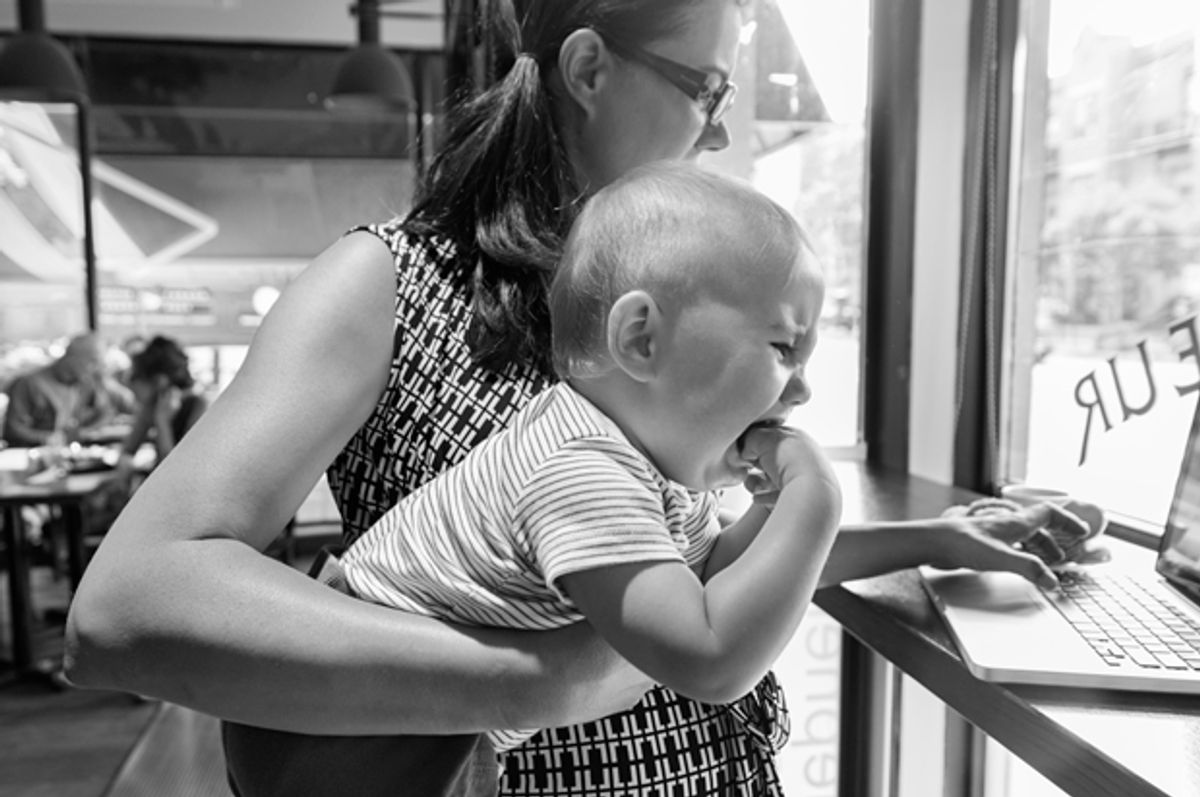
PhD Parenting: The Good, the Bad, and the Unspoken
When I decided to become a mom, I was aware that it would lead to many changes in my work life. I was aware as well that my colleagues might not share my obsessive interest in my child and tried to be conscious about not talking too much about my baby to my colleagues. To my surprise, I found that I was often being asked questions about my baby. Sure, some were to be expected: the “how is your baby doing?” that is synonymous with “how’s it going?” But I also was approached by several people with a more serious interest, asking practical questions about how I was handling my new responsibilities and my opinion on whether the PhD period was a good time to embark on the journey of parenthood.
My colleagues had several thoughts about my decision. Some showed concern over how I would juggle my responsibilities at home with a demanding PhD schedule. Others were enthusiastic about the concept of having a baby, even while admitting they were not ready to do have one themselves until after defending. One person even called me “brave.”
Nature has recently published a career column on fertility issues in academia and claimed that age is “the single most prominent factor affecting conception and birth.” Unfortunately, the age at which most of us women find ourselves as PhD candidates, postdoctoral fellows, or early career researchers coincides with the last window of opportunity for uncomplicated pregnancies. Indeed, Sweden considers a pregnancy of a women over 35 years of age as high risk.
The Good
Parental leave
Let’s start with the obvious: Scandinavian countries are known for their generous parental leave policies, and Sweden is no exception. Parents are allotted 480 days to stay home with their newborn, 360 of which are paid. The pay rate is competitive at 80% of the parent’s salary. In addition to this, Karolinska Institutet contributes an additional 10%, bringing the total for salaried employees to 90% of their normal pay.
Parental leave is not restricted to the mother, but fathers are also expected to stay home to bond with their children. Of the 480-day allotment, 90 are reserved for fathers (the others can be swapped between parents). What sets Sweden apart from other countries with parental leave is that dads actually do take advantage of their leave. The so-called “latte papa” is a recent part of Swedish culture which aims to abolish employment inequality between women and men as well as to encourage bonding between fathers and their children.

Image source: https://inf.news/en/world/e71a48c4acb4d0ed098ec8d40a971adc.html
Integration into Swedish society
Becoming a parent in Sweden plunges you into the world of BVCs, förskola, playgrounds, and other baby-related places. In addition, Stockholm (among other cities) boosts several events for new parents, such as baby swimming classes, baby gymnastics, baby rhythm, and even baby Swedish language meetups, to name just a few. These events not only pull you away from your usual work environment but put you in the place to meet ordinary Swedes doing ordinary Swedish things.
Babies make for good ice-breakers. I have heard several people complain that it is difficult to make Swedish friends. Understandably, people who are new to a city tend to have more time and willingness to make friends than someone with a network of friends and close-by family. Participation in kids’ activities is a unique opportunity to integrate into a society. Not only will you be thrust into an environment of outside of academia, but you will accompany a child that is learning as all Swedes did—through Swedish children’s songs, books, and traditions. You will also certainly pick up some Swedish words from your toddler and his/her favorite songs from förskola!
Safety
If you’re a PhD student on a contract in Sweden, your position is secure. You can count on taking however much time off you would like (up to 15 months is possible for one parent!) and come back to your studies when you’re ready.
Affordability
I was recently talking to an academic in the United States about child care in Sweden. When I mentioned to her that we pay less than $200 per month on daycare for our toddler, she covered her face and exclaimed, “That’s over 10 times less than what we pay!” In her case, this meant that the coming of her third child made it unaffordable for her to work full-time and she dropped her hours in order to take care of her children.
My home state of Massachusetts has the highest childcare costs in the US, with the average at $1743 (roughly 16266 SEK) per month—roughly 60% of a KI PhD student salary! This, coupled with high delivery costs, has led to a reluctance to start a family or has limited the number of children my friends have had.
By comparison, it cost me 200 SEK for my daughter’s delivery and two full days’ stay (all meals included!) at Danderyd Hospital. Beyond the hospital, her daycare costs are nearly covered by the monthly barnbidrag (child allowance, 1250 SEK) we receive from the Swedish government.
The Bad
Collaboration difficulty
The necessity of picking up my daughter by 17:00 (she is always one of the last children there) at daycare means that I have to leave KI by the latest at 16:30. However, my colleagues routinely start their days around 10:00 and continue in the lab into the evening. This led to some difficulties in our working together. While it may seem perfectly fine for someone to bring a collaborator their samples at 16:00 for analysis on a flow cytometer or to help someone gavage mice, my 16:30 förskola pickup schedule makes me an incompatible collaborator. In addition, if I need someone to help me start an experiment, it is unlikely that I will be able to obtain help early enough for me to wrap up in the afternoon.
Limited time
When my daughter first started going to preschool, the recommended schedule for her was from 9:00-14:30. “That’s not possible,” I was quick to tell them. My sambo and I left her from 8:30 to 17:00 and staggered our work schedules so one could start earlier and the other could work later. Even so, she is routinely one of the last children to be picked up.
In the lab, this has meant that my days have become extremely efficient. My time crunch has meant that I am more stringent now on which experiments are worth doing; I have become increasingly interested in help that animal technicians and core facilities can provide; and I attend as few meetings as possible. Evening and weekend work means that I am relying on my sambo to take care of our dog, toddler, and household chores by himself.
My social life has also taken a toll. My lunches are usually spent sitting in front of my computer analyzing data or answering emails. I’ve turned down so many fikas that I’m hardly invited anymore. My colleagues out-of-office events usually occur during dinnertime or late at night – both unappealing times considering the importance of a toddler’s nighttime routine and early wakeup times.
Despite all this, I have found it difficult to stay on top of things. While I used to simply take a later bus if I hadn’t updated the mouse log, finished my analysis, or answered all of my emails, I now have a hard cutoff time. Sometimes, the business of the next day makes it so that wrapping up small tasks from the previous day are forgotten.
VAB
While Sweden as a whole is understanding of parents’ necessity to stay home with sick children, KI is not as forgiving. VAB days, despite being paid from Försäkringskassan (the Swedish Social Insurance Agency) rather than KI money, are not made up for on a PhD student’s contract. For me, this has meant that I have lost two weeks of PhD time in VAB days just in the past year—despite my sambo having stayed home most of the days. This might not seem like much, but as someone facing dissertation deadlines, I can tell you that I would’ve really appreciated those two weeks!
Sleep deprivation
The world of academia has enough challenges to keep one occupied after a good night’s sleep. New parents, however, rarely get that. Young babies need to be fed every couple of hours or so, and they don’t understand the difference between day and night. In addition, even sleep-trained babies tend to wake up when they’re sick or experiencing teething pain.
This isn’t the equivalent of one late night partying; this is chronic sleep deprivation. One survey concluded that parents lose as much as 133 nights-worth of sleep in their babies’ first year alone.
Let that sink in.
Now imagine how it will come across to your group leaders and colleagues when you are constantly forgetful, preoccupied, and generally seem off your game.

Image source: https://www.salon.com/2017/10/28/maybe-it-is-okay-to-judge-parents-after-all_partner/
The Unspoken
Self-critique
There is a guilty sentiment shared by working parents – the guilt of not working enough, and the guilt of not spending enough time with your child. Life can at times seem to be a battle which cannot be won.
This is especially true of parents with little local family support. How often have I been stressed about falling behind on assignments at work only to feel the bang of culpability when I see that my baby is one of the last children at daycare to be picked up? While mormor and farfar may have the afternoons off to hang out with their grandchildren, my sambo and I have to alternate pickup and drop-off times just to get our “full” work hours in. While it is getting better, a part of me sometimes feels that I am lacking in my role as a mother, even as I leave tasks unfinished in the lab to pick L up before 17:00.
“That feeling never goes away,” a group leader recently revealed to me.
Attitude of others
I would be remiss if I didn’t acknowledge that not all will see your decision to become a parent in a positive light. While no one is allowed to outwardly criticize you for having a baby, a new parent is inevitably at some point going to get a side comment about all the things they could be doing if it were not for their little bundle of responsibility.
You may notice those around you are less interested in discussing your career and more interested in wrapping up your projects. You may observe that someone interested in collaborating with you before has asked someone else to help them. Is it a coincidence? Perhaps. But it makes one consider the fine line between being called brave and being seen as rash.
In the world of science, we are shown how research work is enough to fill our days with. A baby becomes your work’s strongest competitor, and the choice to have one at a time where many are focusing on advancing their careers may not be understood by everyone.
Unfortunately, academia is set up so that the transition from being a student to being an independent researcher happens at a time where—biologically speaking—we should be establishing families. For these two to clash at some point is inevitable.
Happiness
Having a baby, from a purely practical point of view, does not make sense for someone with a heavy workload. But let me tell you this: I don’t care. My annoying little freeloader makes me laugh, feel needed, and gives me a sense of purpose in a way that science never could. It is illogical. But it’s the truth.
Final thoughts
I made my personal decision to have a baby understanding that it would change the dynamics of my work and personal life. But when would be a better time? During a postdoc? When starting my own group? While transitioning to a job outside academia? What would be the ideal situation where the lack of sleep and time commitment that comes with a baby would not impact our careers?
I do not mean to say that having a baby is right for everyone or that everyone should go out and have one right now. But for those of us who have always seen ourselves as parents, we need to take a minute to reflect on where our family goals fit in with our professional ambitions. No supervisor, no mentor, no boss can tell you when to make such decisions. It is ultimately up to you.
Rebeca Cardoso
PhD student, dog lover, mom

0 comments